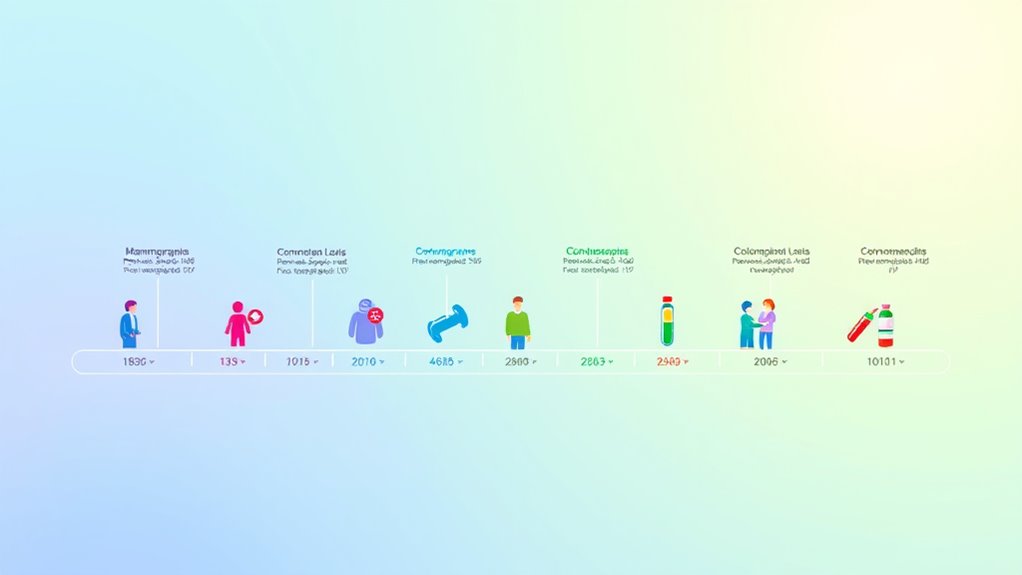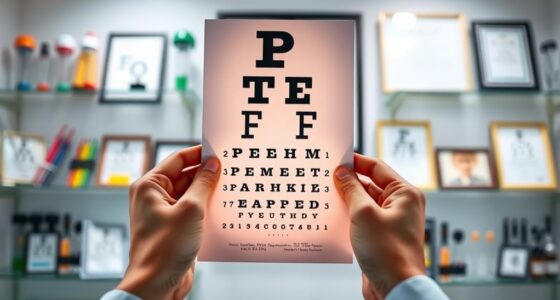A preventive screening timeline adjusts by your age and gender, helping you catch health issues early. In your 20s, focus on mental health, sexual health, blood pressure, and cholesterol. In your 30s and 40s, add cancer screens, genetic tests, and lifestyle checks. Middle age involves heart, bone, and cancer screenings, while seniors need more frequent eye, dental, and mobility tests. Staying informed on specific gender recommendations guarantees you’re covering everything. Keep exploring to learn how to stay proactive at every stage of life.
Key Takeaways
- Screening guidelines vary by age, gender, and risk factors, emphasizing early detection and personalized preventive care.
- Young adults (20-29) focus on mental health, STI screening, blood pressure, and lifestyle habits.
- Adults (30-49) should undergo screenings for blood pressure, cholesterol, cancers, and reproductive health.
- Middle-aged and seniors (50-69+) require monitoring for heart health, cancer screenings, bone density, and vaccinations.
- Gender-specific screenings include mammograms, Pap smears for women, and prostate or testicular exams for men.
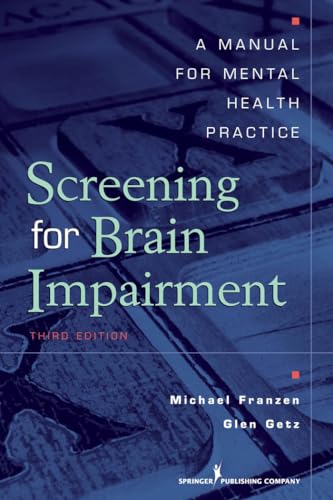
Screening for Brain Impairment: A Manual for Mental Health Practice, Third Edition
Used Book in Good Condition
As an affiliate, we earn on qualifying purchases.
As an affiliate, we earn on qualifying purchases.
Screenings for Young Adults (Ages 20-29)
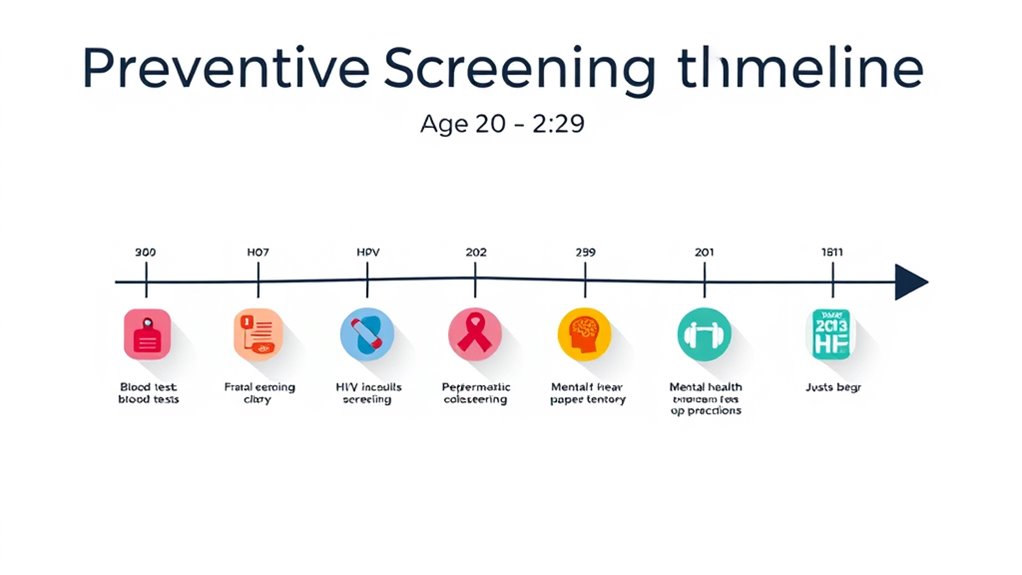
Are you aware of which screenings are recommended for young adults aged 20 to 29? At this stage, focusing on mental health is essential. Regular mental health screenings can help identify early signs of depression, anxiety, or other concerns, allowing prompt support. Additionally, nutrition counseling is valuable for establishing healthy eating habits that last a lifetime. If you have specific health risks or family history, discuss these with your healthcare provider to determine if additional tests are necessary. Maintaining a balanced diet, staying active, and seeking help for mental health issues contribute to overall well-being. Remember, early intervention and preventive care in your twenties set the foundation for a healthier future. Incorporating preventive healthcare into your routine can further enhance your long-term health. Also, exploring tuning options for your vehicle can keep your car performing optimally, just as maintaining your health ensures your best quality of life. Being aware of screening guidelines for your age group can help you stay on top of recommended health checks. Staying informed about vetted health products can support your wellness journey and ensure safety.
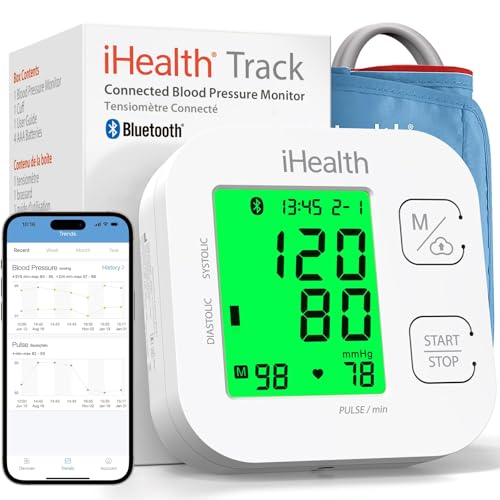
iHealth Track Smart Upper Arm Blood Pressure Monitor with Wide Range Cuff That fits Standard to Large Adult Arms, Bluetooth Compatible for iOS & Android Devices
Clinically Accurate: Easy Operation by two buttons, Advanced Accuracy, No Calibration required.
As an affiliate, we earn on qualifying purchases.
As an affiliate, we earn on qualifying purchases.
Preventive Measures for Adults in Their 30s and 40s
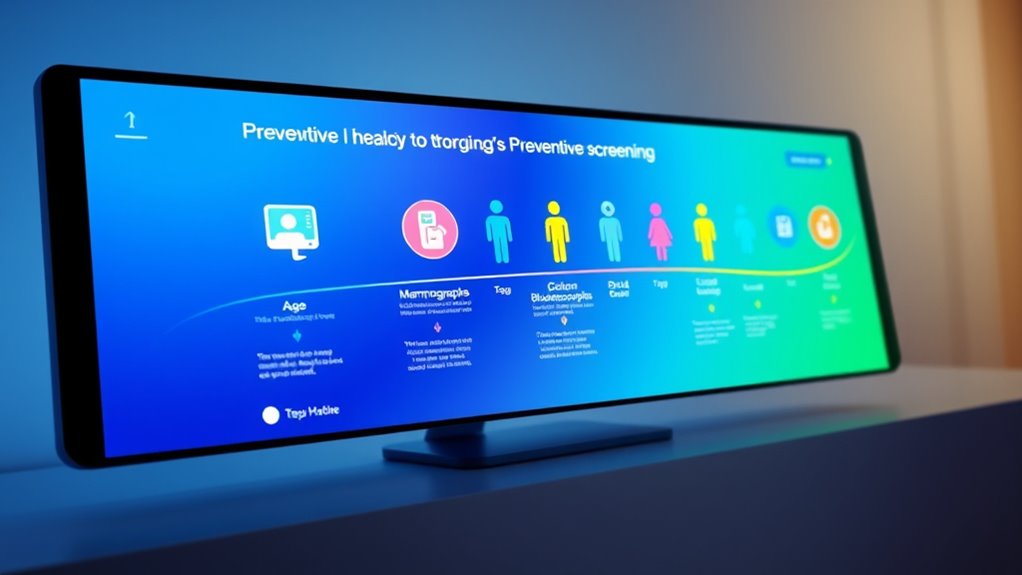
As you reach your 30s and 40s, regular health screenings become increasingly important to catch potential issues early. Your lifestyle choices and risk factors play a significant role in maintaining your overall well-being. Staying proactive with these measures helps you stay on top of your health as you age.
Routine Health Screenings
Routine health screenings become vital in your 30s and 40s to catch potential health issues early and maintain overall well-being. During this time, genetic testing can identify inherited risks, guiding personalized prevention strategies. Regular dental assessments help prevent cavities, gum disease, and detect oral health problems before they worsen. Blood pressure and cholesterol checks are essential to monitor heart health, especially if you have a family history of cardiovascular issues. Diabetes screening is recommended to catch early signs of the disease. Additionally, screenings for skin cancer and eye health should be incorporated into your routine. Staying proactive with these screenings ensures early detection and management of health concerns, empowering you to maintain a healthier lifestyle well into your later years. Incorporating mammography guidelines into your screening plan is also important, especially for women, to detect breast cancer early when it is most treatable. Regularly updating your preventive care schedule can help you stay on top of necessary tests and screenings. Moreover, understanding regional divorce statistics may seem unrelated but highlights the importance of proactive health and legal planning to protect your well-being and future stability.
Lifestyle and Risk Factors
Have you considered how your daily choices impact your long-term health? Your lifestyle and risk factors play a vital role in preventing chronic diseases. Regular physical activity, a balanced diet, and avoiding smoking reduce your risk of heart disease, diabetes, and other conditions. Nutritional counseling can help you make healthier food choices tailored to your needs. If you have a family history of certain illnesses, genetic counseling offers personalized insights and early intervention strategies. Managing stress and limiting alcohol also contribute to overall well-being. Incorporating these preventive measures in your 30s and 40s sets the foundation for healthier years ahead. Additionally, understanding the importance of a raw food diet can support your nutritional goals and promote overall health. Recognizing the connection between body and spirit in Indigenous wellness practices can further enhance your holistic approach to health. Being aware of your health risks is essential for making informed lifestyle decisions that can reduce your likelihood of developing chronic conditions. Practicing mindful decluttering can also help reduce stress and improve mental clarity, contributing to better health outcomes.

QuCare Complete Total Only Cholesterol Test, 2 Tests, Quick, Simple & Easy-to-Use, Clear Easy to Read Results, Detects Cholesterol Levels in Your Blood
Total Cholesterol: This is the cumulative measure of all types of cholesterol in your blood. This is the…
As an affiliate, we earn on qualifying purchases.
As an affiliate, we earn on qualifying purchases.
Screenings for Middle-Aged Adults (Ages 50-59)
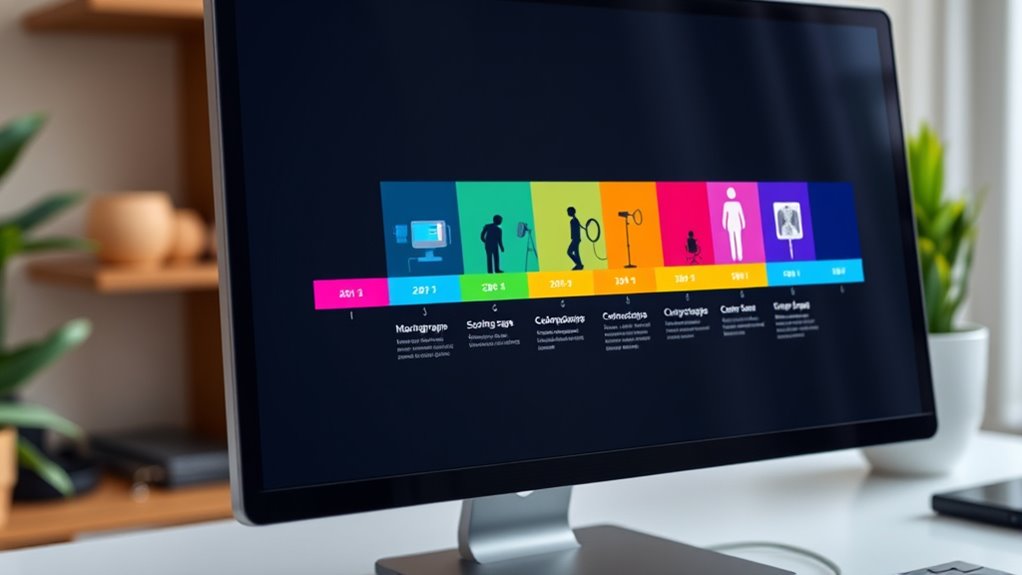
As you enter your 50s, it’s important to prioritize screenings that catch potential issues early. You should consider heart disease tests, cancer screenings, and bone density checks to stay ahead of health risks. Taking these steps now can make a significant difference in maintaining your well-being. Being aware of signs of spoilage in your food and beverages, such as lemon juice, can also contribute to overall health and safety. Additionally, understanding AI’s impact on privacy and regulation can help you stay informed about how personal data is protected during health screenings and related medical processes. Educating yourself about cybersecurity measures related to health data can further enhance your safety and privacy. Recognizing relationships and trust issues can also be beneficial in understanding how emotional health impacts physical well-being.
Heart Disease Screening
Starting at ages 50 to 59, it’s important to prioritize heart disease screening to detect risk factors early. Regular checkups can include blood pressure and cholesterol tests, which reveal your heart’s health. You might consider genetic testing if you have a family history of heart disease, helping identify inherited risks. Don’t overlook mental health, as stress and depression can impact your heart health; discussing these aspects with your doctor is essential. Lifestyle assessments, such as evaluating diet, exercise, and smoking habits, are also vital. Early detection allows for better management of conditions like hypertension or high cholesterol, reducing your risk of heart attacks or strokes later. Staying proactive with screenings and mental health awareness keeps your heart healthier longer. Understanding health risks can empower you to make informed lifestyle choices and seek appropriate medical advice. Recognizing preventive measures and staying vigilant can significantly improve your overall cardiovascular health. Additionally, understanding the benefits of regular screenings can help motivate consistent health monitoring. Incorporating comprehensive health assessments, including lifestyle and mental health factors, enhances the effectiveness of early detection efforts.
Cancer Prevention Tests
For middle-aged adults between 50 and 59, regular cancer screenings play a crucial role in early detection and prevention. Screening options include mammograms, colonoscopies, and PSA tests, which help identify potential issues before symptoms appear. Genetic counseling can be valuable if there’s a family history of cancer, guiding you on personalized screening schedules. Additionally, evaluating environmental exposure risks can inform your screening needs. Regularly reviewing your personal health profile can help identify specific risks and customize your screening plan. Understanding risk assessment can further tailor your screening strategy to your personal health profile. Being aware of lifestyle factors that influence cancer risk can also help in making informed health decisions. Incorporating preventive health strategies such as lifestyle modifications can significantly reduce your overall risk.
Bone Density Checks
Bone density checks are vital for middle-aged adults because they can identify early signs of osteoporosis before fractures occur. As you age, your osteoporosis risk increases, especially if you have a family history or other risk factors. These screenings help determine if your bones are weakening, allowing for early intervention. Maintaining adequate calcium intake is essential for bone health, but a bone density test provides concrete evidence of your current condition. If your results show reduced bone density, your healthcare provider may recommend lifestyle changes, medication, or supplements to strengthen your bones. Regular screening for ages 50 to 59 ensures you stay ahead of potential issues, reducing fracture risk and supporting long-term bone health. Don’t wait—talk to your doctor about scheduling a bone density check.
women's mammogram scanner
As an affiliate, we earn on qualifying purchases.
As an affiliate, we earn on qualifying purchases.
Health Checks for Seniors (Ages 60-69)

As you enter your 60s, regular health checks become essential for maintaining your well-being and catching potential issues early. During this decade, focus on osteoporosis screening and hearing tests to stay proactive about your health. Osteoporosis screening helps identify bone loss before fractures occur, while hearing tests can detect early declines that affect communication and safety. Schedule these screenings periodically based on your risk factors. The table below summarizes key checks:
| Screening Type | Frequency | Purpose |
|---|---|---|
| Osteoporosis screening | Every 2 years or as recommended | Prevent fractures and bone loss |
| Hearing tests | Annually or if hearing issues arise | Detect early hearing decline |
| Blood pressure checks | Annually | Monitor cardiovascular health |
| Blood tests | Every 1-2 years | Assess cholesterol, glucose |
Being aware of screening guidelines can help you stay on top of recommended health assessments.
Recommendations for Those in Their 70s and Beyond

Maintaining your health in your 70s and beyond requires ongoing vigilance and regular screenings tailored to age-related risks. Prioritize dental health by scheduling regular checkups and cleanings, as oral health impacts overall well-being. Vision tests are also essential; they help detect issues like cataracts or macular degeneration early, ensuring your sight stays clear. During this age, your healthcare provider may recommend more frequent eye examinations and dental assessments. Staying proactive with these screenings helps prevent complications and maintain your quality of life. Remember to discuss any changes in vision or dental health with your doctor promptly. By staying attentive to these areas, you support your overall health and independence well into your later years.
Gender-Specific Screening Considerations for Men
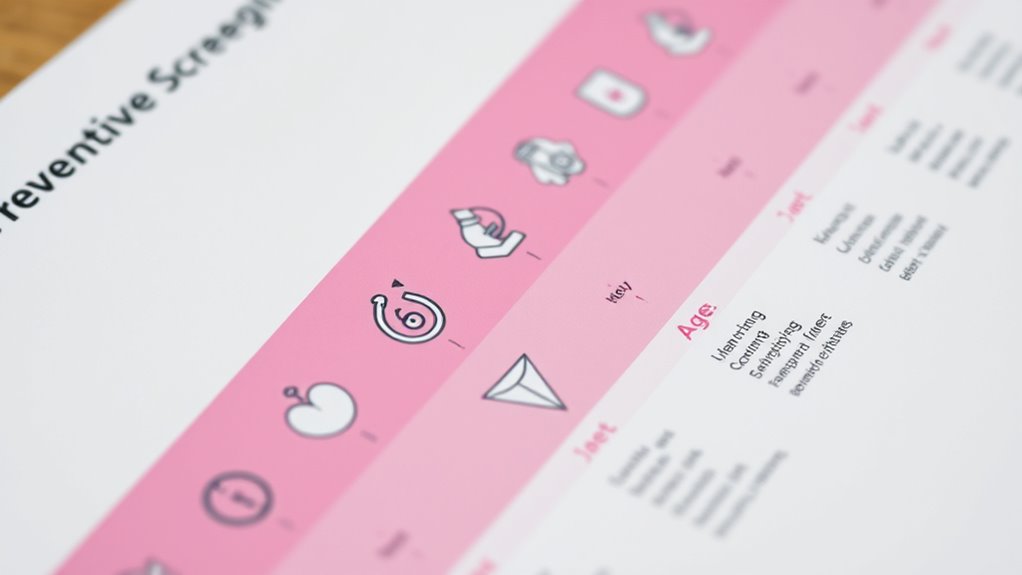
Because men have specific health risks, tailored screenings are crucial for early detection and prevention. Regular checkups can catch issues before they become serious. Key screenings include:
- Prostate screening: Starting at age 50, or earlier if there’s a family history, to detect prostate cancer early.
- Blood pressure and cholesterol tests: To identify cardiovascular risks common in men’s health.
- Testicular exams: Recommended during annual checkups, especially for men aged 20-40, to catch testicular cancer early.
These screenings help you stay proactive about your health. Focusing on men’s health and prostate screening ensures you’re taking the right steps to prevent illness and maintain well-being. Don’t skip these essential assessments; early detection saves lives.
Gender-Specific Screening Considerations for Women
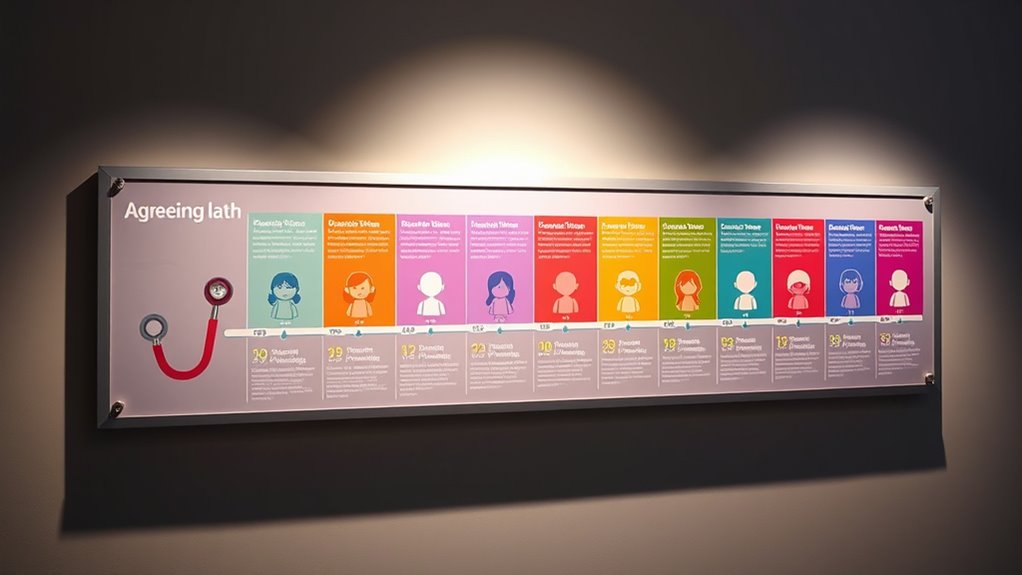
Have you scheduled your regular screenings to catch health issues early? Women need to contemplate gender-specific screenings tailored to reproductive health and menopause management. Regular Pap smears and HPV tests help detect cervical cancer early. Mammograms are essential for breast cancer screening, typically starting at age 40 or earlier if risk factors exist. Bone density tests become important during menopause to monitor osteoporosis risk. Here’s a quick overview:
| Screening | Recommended Age |
|---|---|
| Pap smear & HPV | Every 3 years from age 21-65 |
| Mammogram | Annually starting at age 40 |
| Bone density | Starting at age 65 or earlier if needed |
| Cholesterol & blood pressure | Every 1-2 years |
Stay proactive to maintain your health through timely screenings.
Special Screenings for High-Risk Groups
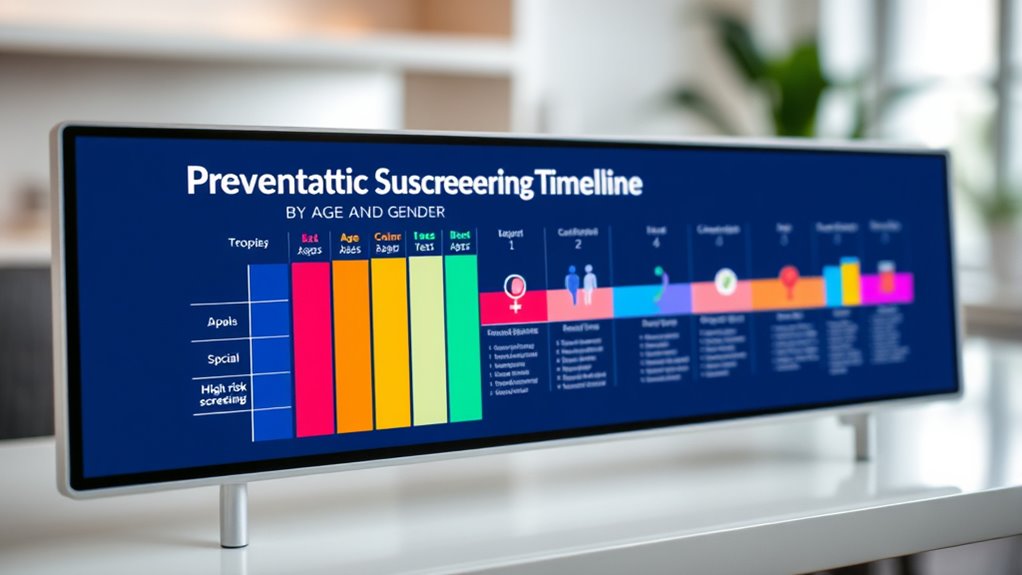
While standard screening schedules benefit most women, those with elevated risk factors need tailored testing to catch health issues early. High-risk groups should consider specialized screenings like genetic testing to identify inherited conditions early. Travel screenings are also essential if you frequently travel to regions with specific health risks. Here are key considerations:
- Genetic testing to assess inherited disease risk.
- Travel screenings tailored to destinations to prevent illnesses.
- Additional blood tests or imaging based on personal or family history.
These targeted measures help detect issues before symptoms appear, allowing for early intervention. If you fall into a high-risk category, consult your healthcare provider to develop a personalized screening plan that includes genetic testing and travel screenings relevant to your lifestyle and medical history.
Adjusting Screenings Based on Personal and Family Medical History
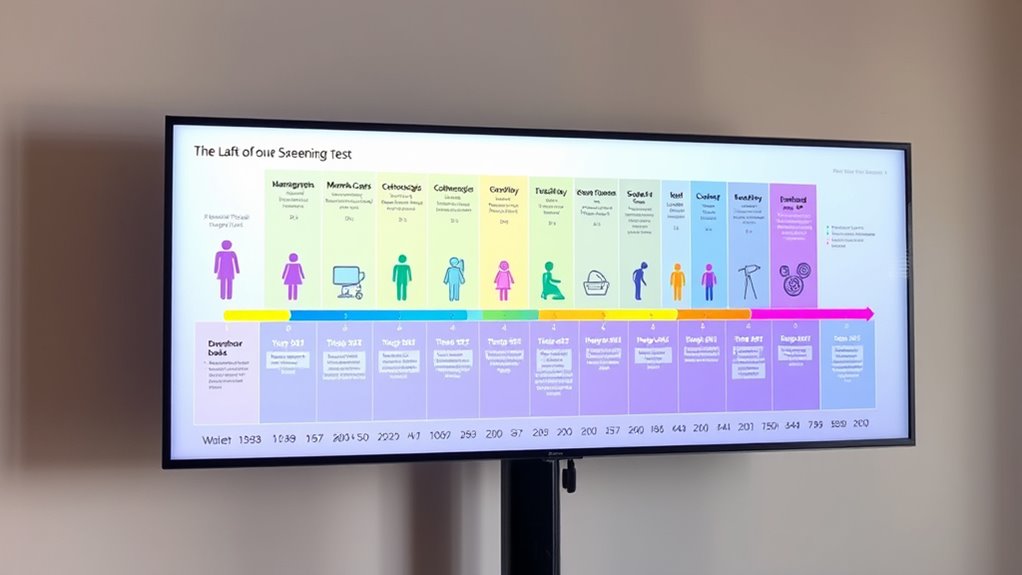
Your personal and family medical histories play a crucial role in shaping your screening schedule. If you have a family history of conditions like cancer or heart disease, your doctor might recommend earlier or more frequent screenings. Genetic testing can identify inherited risks, helping you and your healthcare provider tailor preventive measures. Additionally, if you plan to travel internationally, your history might influence the need for specific travel vaccinations to prevent illnesses prevalent in your destination. Sharing detailed family health information ensures your screenings are personalized and effective. By adjusting your screening timeline based on your medical background, you improve early detection and prevention. Always communicate openly with your healthcare provider about your family history and lifestyle to optimize your preventive care plan.
Frequently Asked Questions
How Often Should I Update My Screening Schedule as I Age?
You should revisit your screening schedule regularly, especially as you experience age-related changes. Screening intervals may need adjustment based on new risk factors or health updates. Typically, your healthcare provider recommends updates every few years or sooner if symptoms or concerns arise. Staying proactive ensures early detection and better health management. Keep open communication with your doctor to tailor your screening schedule as you age, adapting to your evolving health needs.
Are There Screenings Recommended for All Genders at the Same Age?
You might wonder if all genders follow the same screening schedule. While shared screening protocols cover some tests like blood pressure and cholesterol, gender-specific recommendations exist for screenings such as mammograms for women and prostate exams for men. You should discuss with your healthcare provider to understand which screenings are appropriate for you based on your gender, age, and health history, ensuring you’re proactively managing your health.
What Lifestyle Factors Influence the Timing of Preventive Screenings?
Think of your health as a garden that needs tending. Your lifestyle habits—like diet, exercise, smoking, and alcohol use—act as the sunlight and water, shaping when screenings are needed. Environmental exposures, such as pollution or workplace hazards, can also influence timing. By nurturing your health and minimizing risks, you guarantee your screenings happen at the right moments, helping you catch issues early and keep your life’s garden thriving.
How Do Screenings Differ for Individuals With a Family History of Disease?
If you have a family risk factor or genetic predisposition, your screenings may need to start earlier or be more frequent. Your healthcare provider considers these factors to assess your risk for certain diseases. They might recommend additional tests, like genetic counseling or more frequent cancer screenings, to catch issues early. Always discuss your family history openly so your screening plan can be tailored to your specific genetic and family risk factors.
When Should I Start Considering Screenings for Rare or Less Common Conditions?
You should start considering screenings for rare conditions based on your personal and family medical history, along with your age and lifestyle. If you have risk factors or symptoms, it’s wise to discuss with your healthcare provider when to initiate screening for these less common conditions. Screening initiation for rare conditions often begins earlier if genetic factors or specific exposures increase your risk, so stay proactive and seek personalized advice.
Conclusion
Sticking to your screening schedule isn’t just about catching issues early—it’s like giving your health a head start. Some say that regular checkups can even boost your longevity, almost like a secret weapon against aging. So, stay proactive, know your risk factors, and trust that early detection can truly make a difference. After all, your health is your most valuable asset—treat it like a priority to enjoy a vibrant, long life.
